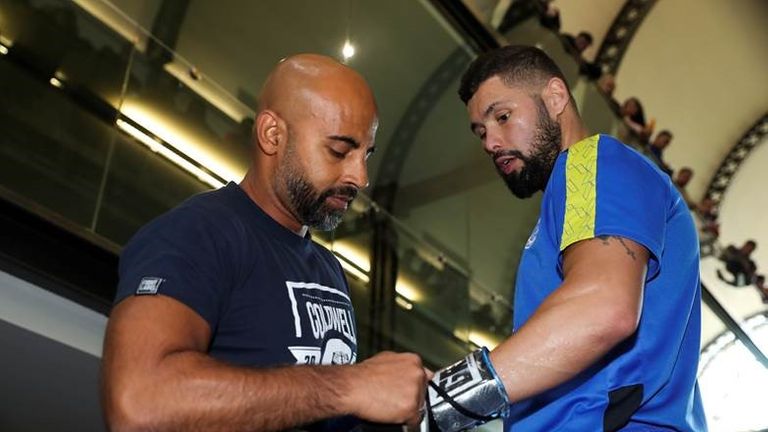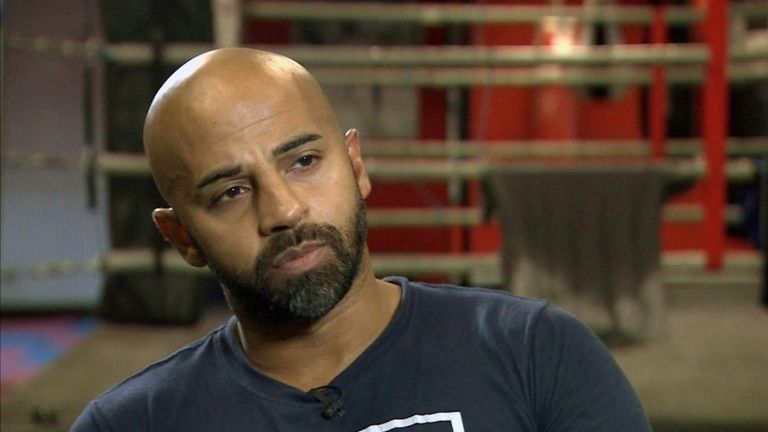Last month, Boxing Social talked to Steve Wood about the obstacles that will be faced by promoters who put on small hall shows. Dave Coldwell doesn’t like that term. Back in February 2012, I followed him around the Bowlers Exhibition Centre for a piece on those type of shows and he objected when the term popped up.
Coldwell was putting stickers on seats when we talked. Some sections of ringside hadn’t been stickered up, so when people arrived they wouldn’t know where to sit and it would have become a free-for-all. He was promoting the show so felt compelled to make sure the job was done. That is the lot of the small hall, Off-TV promoter.
As he carefully and laboriously put stickers on each and every seat, the then-promoter told me that people like himself, Steve Wood and others did sometimes put on shows in small venues, but at other times they put on bigger shows that didn’t take place in front of the television cameras so he preferred the phrase “Off-TV shows”.
Either way, in boxing it is a case of ‘Out of sight, out of mind’ and when the cameras are not present the onus is on the promoter, the fighters and, let’s not forget this, the fans to generate the money required to put on the types of local shows that gave Scott Quigg, Terry Flanagan and Josh Warrington the platforms required to move on to their world title winning careers.
The post-Covid world could kill these shows. In last month’s article, we looked at the rules in place to bring boxing back again yet these plans would cut ticket sales down to the bare bones. If ticket sales go south, careers cannot soar north, so what is the long-term solution? In short, boxers are going to have to take 50-50 fights, and the ones who ‘um and ah’ about them are going to get left behind in the new world.
“Small hall boxing is about selling tickets,” stated Coldwell. “If there is no crowd then there are no ticket sales, so how do promoters put on those types of shows? Listen, the fans of the fighters would normally buy tickets just to support their local fighter, but will they pay to watch them on YouTube? Plus, a lot of them go to the boxing for a night out. They have a drink, enjoy the atmosphere and everything else. How many will stay at home to watch the shows? Regardless of all that, how do you cover the cost of the show: the venue, the purses of the fighters and other fees? It is going to an absolute nightmare.
“People don’t understand the amount of work that goes into these events,” he added. “You are busting your balls just trying to break even. You might have one or two fighters who sell enough tickets to bring money into the show to get you a profit, but you might have other fighters on the show who are either just breaking even or you are losing money on them. The hustle goes into just breaking even.
“People might not even go there to see the fighters who are under the main event, the ones who may have done 50 or 70 tickets so aren’t even able to cover their own fight. It is going to be a serious challenge, especially with the extra measures. I can’t see how it is going to happen. Some promoters have businesses that can support the losses so can consider that, but who wants to be losing money? It is pure financial loss to put on these shows a lot of the time.
“I personally don’t think the government will allow big crowd events this year, so that’s a write off right there. Everyone will be two metres apart. You will have limited corner teams. I’ve seen Eddie [Hearn’s] plans, and they are fantastic, but he is willing to lose money on shows to keep his fighters active, so fair play to him, yet smaller promoters don’t have that luxury. They don’t have that TV budget. I can’t see it being up-and-running for a while.
“Once a fighter gets to eight rounds, the fights become more expensive to put on and the ticket sales don’t always cut it. You lose that cushion that you need. Then you get a fighter to a title fight and you have to hand them over to the TV promoters. That is where they then have to take over because the fights become too expensive without that TV budget. Without the small hall, you lose that conveyor belt of fighters who go on to fight for titles.”

of Tony Bellew (right), but also grafts as a promoter of Off-TV shows. Photo: Sky Sports.
Once the ‘Lockdown’ ends, we are going to stumble into a strange new world. We will rub our eyes, shield them from the sun, stagger to the local shop for a boxing magazine — Boxing News is the one I’d recommend — and then blink in disbelief at the news that a few fighters have turned down title shots because “The terms don’t suit me”.
It is a tragic thought, yet we might be walking out into a world where Dillian Whyte has to actually take a world title fight when it is offered to him rather than turning it down and then blaming the promoter, the purse on offer, the TV networks, the man who works at his local chippy, and the fact that they refused to remove blue M&Ms from his post-fight rider and replace them with yellow Peanut M&Ms – instead of holding himself to account for a career that is now firmly on hold, both literally and in every other sense that you can imagine. The long and short of it is that Whyte is the architect of his own irrelevance when it comes to the heavyweight top table.
“What I think is that we will go back to how boxing used to be,” said Coldwell. “Fighters who are undefeated in five or six fights who are the home fighter will have to take a risk. They will have to fight on away shows. You will get fighters who win and lose, people like Dennis Andries and Johnny Nelson. Fighters used to have losses on their record and not get called a ‘journeyman’. These days you have a few losses and people are writing you off. A journeyman does it as a job — he tucks up and gives you rounds. A professional fighter is someone who might win and lose some yet that is how it used to be. We will need to go back to that mentality and that way of looking at it.
“This might go on for a few years. Fighters who are coming through now might be forced into either going out and getting a job or taking risky fights against Eddie or Frank [Warren’s] fighters. I think we are going to see some big changes. There is a school of thought with some fighters these days that you need a training camp for a four-rounder. What absolute bullshit that is.
“Training camps used to be for when you are going for a title. You’d get yourself away somewhere, set up a camp and take the time you needed. People are talking about going into camp when they are living at home and just getting themselves ready for a four-rounder. It is ridiculous. Fighters used to fight on much shorter notice and on a regular basis. We might have to go back to that.
“We also don’t know if there will be a second spike and sports will go on the backburner again. We don’t actually know what will happen. Once it opens up again, fighters need to make the fights they need to get their careers going again. There are fighters who are coming towards the end of their career and this is a big, big gap for them. You need to get back up there quickly and get the fights you need.”

to work in boxing’s new world. Photo: Sky Sports.
Coldwell also shares the belief that boxing’s biggest challenge is social distancing. How do you turn a tactile sport into a sterile, two metres apart one where people who have not seen each other for months forget years of social conventions? And how do you go about enforcing these rules of social distancing?
“Then you’ve got the way we are in boxing,” he concurred. “We shake hands, we do fist bumps and hug, so how do we greet each other now? It goes back years. It is all going to change. We will have to adhere to the guidelines and stick with it. Other places have relaxed the rules and seen another spike. I’m interested to see how things go when we’ve all been back to work, back on public transport and mixing again.
“We’ve stopped the world. The health experts tell us it is not about money. Yeah, we get that, but people need money to live. If you haven’t got money you can’t contribute to the economy, you can’t feed your family and pay your rent. The billions that have been spent supporting the country to fight this disease will take us decades to pay off – will my kids will be paying it off in the future? It is not about putting health over wealth, it is about being realistic. Whether you are a boxer, a footballer or someone doing a nine to five you need money to live. We have to manage this disease, not just sit it out. Listen to advice, wear a mask, use the hand sanitisers, and allow employers to figure out how to make this thing work.”
Like a few others within the trade, the former fighter is also wary of the long-term effects of the Lockdown and its impact on families. Coldwell told me that there is a lot of talk about the effect that this situation will have on the economy yet he is also concerned that the real impact of these strange times will remain unseen while causing a lot of damage in the long-term.
“You also have anxiety to take into account,” he stressed. “Mental health will suffer. If there is poverty then you know that there will be other issues. When poverty goes up so does domestic violence. It might be Covid that gets some people, it might be something else caused by the other issues that are caused by it. There is a lot of stuff to consider and a lot of people are going to suffer in many different ways.”
I am supposed to add a conclusion at this point. We need to wrap things up and throw a bow around this little word package. I don’t have a conclusion. My ribbon is wrapped around the old oak tree that the local dogs piss on. The reality is that we are still working out how things will go once Lockdown is gone. One thing that we can take for granted is that: “Toto, I’ve a feeling we’re not in Kansas anymore.”